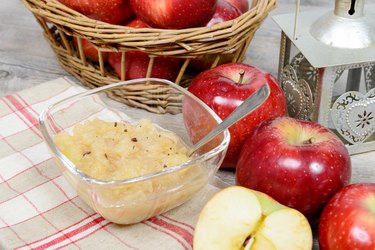
The glycemic index measures how foods affect your blood sugar. Items with a high glycemic index -- 70 or more -- are digested quickly, causing your blood sugar to spike and then drop rapidly. A diet based primarily on foods with a high glycemic index may increase your risk of obesity, elevated cholesterol and Type 2 diabetes. By contrast, a diet rich in foods low on the glycemic index, such as most vegetables, whole grains and fruits, including certain types of applesauce, may help prevent chronic medical problems.
Low Glycemic Index
Video of the Day
According to a 2006 report published in "The Journal of Nutrition," plain, unsweetened applesauce has a glycemic index of 53. This is approximately the same as the glycemic index for corn tortillas, bananas, grapes, pineapple and plain spaghetti noodles. Applesauce has a higher glycemic index than raw apples, which have a score of 38. However, since applesauce has a glycemic index less than 55, it is still considered an appropriate choice for people aiming to consume foods low on the scale.
Video of the Day
Low Glycemic Load
While the glycemic index of a food is one tool to choose healthy foods, the glycemic load may be a more useful gauge, advises registered dietitian Molly Kimball. Unlike the glycemic index, which measures how 50 grams of a food affect your blood sugar, the glycemic load measures the effect of consuming a typical serving size of particular foods. A 1/2-cup serving of plain applesauce has a glycemic load of 11, a value that places it within the moderate range on the glycemic load scale.
Recommended Intake
The Cincinnati Children's Hospital Medical Center tells patients on a low glycemic index diet to avoid sugar-sweetened applesauce. Applesauce containing added sugar will have a higher glycemic index than plain versions and should be eaten only occasionally and in small portions if at all. For the healthiest applesauce with the lowest possible glycemic index, try preparing your own sugar-free version with unpeeled apples, and spice it up with seasonings like nutmeg, cinnamon or lemon juice.
Expert Insight
Kimball points out that a food's glycemic index is based on your blood sugar reaction when you consume it on an empty stomach. This value is lower when the food is eaten with a rich source of fiber, protein or healthy fats. For example, applesauce will have less of an effect on your blood sugar if you eat it as a side for roasted pork tenderloin, brown rice and steamed broccoli than if you consume it plain as a snack. Aim to eat applesauce with other foods low on the glycemic index to keep your overall totals low.
- Academy of Nutrition and Dietetics: What is Glycemic Index?
- American Diabetes Association: Glycemic Index and Diabetes
- The Journal of Nutrition: Development of a Glycemic Index Database for Food Frequency Questionnaires Used in Epidemiologic Studies - Table 1: Glycemic Index and Glycemic Load Values
- Linus Pauling Institute: Glycemic Index and Glycemic Load
- Cincinnati Children's Hospital Medical Center: Glycemic Index Chart "Stop Light Approach"
- Food Network: Make Your Own Applesauce
- University of Wisconsin Hospital and Clinics: Glycemic Index